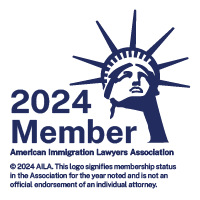A foreign national who has held permanent residence status (“green card”) for four (4) years and nine (9) months, OR the spouse of a U.S. citizen, still married to the same spouse through whom he/she obtained permanent residence is often eligible to apply for naturalization and thus become a United States citizen. However, not all permanent residents are eligible to naturalize. Care must be taken to insure that there are no criminal problems, conduct problems, or issues regarding absences that will lead a person to be denied naturalization or worse, to be placed in removal proceedings because of absences, criminal activity, or improper conduct. In such cases, a person would be better off not applying to naturalizes. Special procedures exist for naturalizing the children of United States citizens under 18 years of age.
A person born in the United States is a citizen from birth. In addition, however, citizenship can be conferred at birth through parentage. If a foreign born person’s parent or parents are citizens, it is possible that the person is a citizen from birth. Much depends on the residence of the parents before the birth of the child, whether it is the mother or father or both who are citizens when the child is born, what year the child was born, whether the parents were married when the child was born, and other factors as well. If a person is born of a citizen parent, it is worthwhile to analyze the relationships to determine whether the person may be a United States citizen. Further, contrary to popular conception, marrying a United States citizen does not confer citizenship, nor does being adopted by a United States citizen confer citizenship. Adoptees and their adoptive parents need to be careful to analyze the immigration status of their adopted children and to take steps to insure that the children are present in the United States in lawful status and become citizens, if that is the parents’ goal. Insuring that your adopted child is a United States citizen is very important because of the harsh consequences to non-citizens of illegal conduct that can lead to being placed in removal proceedings. Children who celebrated or will celebrate their 18th birthdays before February 27, 2001, who are lawful permanent residents, and who have a parent with whom they have lived who is a United States citizen, are automatically United States citizens. Proof of citizenship can be obtained form the CIS or by obtaining a passport.
A foreign national who has served in the United States military during a period of military hostilities on active duty and was discharged under honorable conditions is often eligible to naturalize. Vietnam War and Gulf War service are considered wartime service. So is service in the war on terrorism. The foreigner need not have served where the war was being fought to qualify. Certain crimes may bar a service member from applying for naturalization if they were committed after November 29, 1990. Further, the applicant for naturalization must demonstrate good moral character for the year period before making application. In addition, the foreigner must have enlisted or reenlisted in the United States or a U.S. territory or ship or have become a lawful permanent resident. Being in removal proceedings does not preclude seeking naturalization under these provisions for soldiers who served in the United States military during a period of military hostilities. The relevant dates are:
1. World War I (specifically, between April 6, 1917, and November 11, 1918).
2. World War II (specifically, between September 1, 1939, and December 31, 1946).
3. the Korean hostilities (specifically, between June 25, 1950, and July 1, 1955).
4. the Vietnam hostilities (specifically, between February 28, 1961, and October 15, 1978).
5. Persian Gulf Conflict (specifically between August 2, 1990, and April 11, 1991).
6. September 11, 2001 to the present (Pursuant to Executive Order 13269 of July 3, 2002).
Also see this pages for detailed information about citizenship and naturalization:
